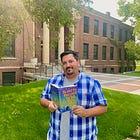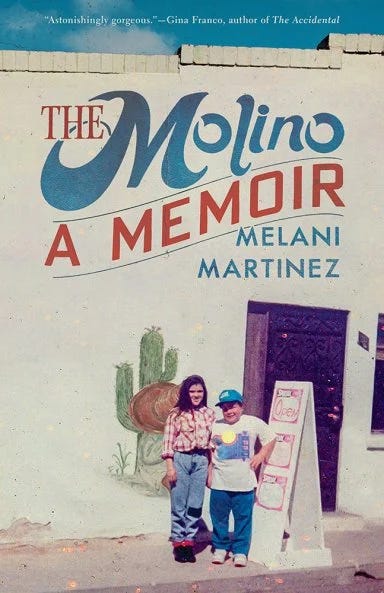#NuevasPáginas: Loss of cultural memory
with Mele Martinez author of 'The Molino: A Memoir'
Hey Book Franz,
Happy New Year? I state it as a question because, for me, the New Year hasn’t felt so “happy”. If you’ve been with this bookish newsletter a while or know me from social media, I am big on making space for real feelings. I want to be more honest about how I am truly feeling when people ask me how it’s going and lead less with “I’m okay”.
If this long month of January has taught me anything, it’s that I want to lean more into making space for all the feelings. So, how are you doing? I’m asking genuinely and want to make space for any level of honesty you want to share. If it’s been a Happy New Year — I want to hear that even if it hasn’t been felt great to me. If it’s been a tough one, I also want to hear about that too. With all the chaos in the world, I’m inclined to invest in my communities, and I hope you know I consider YOU someone I am in community with. I’m grateful you are here, I don’t take it for granted. So, if you have the space today, drop me a line in the comments of today’s issue.
I know the last #NuevasPáginas interview was titled “A Love Letter to Tucson”:
I figured what better way to return to sharing author interviews than continuing with the Tucson love. I have about 6-7, if not more, interviews in my backlog from last year to share with you all before we venture into interviews with Latine authors who have books coming in 2025, and I’m committed to getting them in your inboxes.
Today’s special guest author is the beginning, and I hope you’ll take a moment to learn a little about her book. I was talking to a friend who said she was spending time catching up on all the #NuevasPáginas author interviews, and I thought that was so special. I also told my friend that while I appreciate their commitment and support, I understand if not every interview piques an interest. I share that to say that I try my best to highlight a general theme for a book/author in the title of the email — please know it’s okay if you don’t get to them all. You being here is a huge support.
In bookish love,
#NuevasPáginas is a space that aims to amplify and spotlight Hispanic/Latine/x authors with newly published books. The goal is to connect readers to their next favorite Hispanic/Latine/x authored book through a mini casual get-to-know-the-book-and-author interview. So please help me connect to more readers. So that together we can continue to build the love/support of Latine literature!
Without further ado…our special guest author for today’s Nuevas Pagina issue is…Mele Martinez author of The Molino: A Memoir
Could you tell me a bit about where this photo was taken? Is it special to your book in some way?
This is a self-portrait taken at my writing desk in my home in central Tucson. I write about traveling back and forth between the West Side and East Side of Tucson as a kid. My adult home is now somewhere in the middle of East and West, so for me it symbolizes a kind of Tucson nepantla.
Tell me about your book without telling me about your book - share any literary inspirations behind your book! If there are none, the gap you wanted to fill in the literary canon with your book.
I think books voicing the experiences of Mexican Americans from Tucson / Sonora are underrepresented, so I hope The Molino helps to fill that gap. Certainly, Tucson authors like Patricia Preciado Martin and Lydia Otero were part of the inspiration for this book. I also draw a lot of inspiration from sacred texts which helped me create the language, perspective, and tone of the second narrator in the book, a spirit called El Pensamiento. He appears like a mythical character, inspired in part by iconic narrators like El Pachuco in Luis Valdez's Zoot Suit.
What kind of conversations are you hoping your book will provoke?
Beyond the familiar conversations about remembering parts of Tucson's food history, I hope this book helps people think more about our responses to gentrification and loss of cultural memory. I think it could also help us talk about how Mexican Americans, in particular, are represented or portrayed in society (both past and present) and how we might choose to tell our stories rather than having them told on our behalf.
What is something you learned while writing your book? In what ways did it change you?
I used to think that the way my family communicated and lived was so limited and simple, but I've learned that their language and expressions are more sophisticated and nuanced than I could ever imagine.
If a book was home, where would your home be?
Tucson.
If your book was a famous musician who would it be?
This is a tough one to answer, but I think I have to pick Linda Rondstadt. Rondstadt often collaborated with other voices in her music and likewise The Molino wants to present multiple voices. She sings biculturally/bilingually and across genres. Similarly, The Molino moves between the genres of creative nonfiction, fiction, and poetry and also employs Spanish to make the most of what is trying to be said in English while also communicating the cultural shifts happening over time. Both tell stories of getting out of where you grew up and of coming home. Rondstadt's music recognizes and honors family and ancestors, just as my book tries to do. Of course, both are also from Tucson
What comfort food could a reader pair with your book?
So many! Tamales, tacos, tortillas, cocidos, enchiladas, quesadillas, barbacoa, rice and beans, guacamole, chips and salsa, taco salad, ceviche, chile con carne, coctel de elote, bean and cheese burritos, pico de gallo, watermelon, snickers bars, and cinnamon tea over crushed ice.
In what ways has access (or little to no access) to Hispanic/Latinx/e literature defined you as a writer?
The access that I had to books like House on Mango Street, Drink Cultura, and Days of Plenty, Days of Want, had a huge impact on me in high school and during my undergrad years. Before that, I wasn't much interested in reading books. In those books, I recognized that someone like myself could become a writer. Though I wasn't exposed to many writers that I connected to, these books helped me see myself as a person who could finish reading a whole book, and maybe someday finish writing one too.
Where can readers keep up with your work?
I'm on IG @melemartinez and my website is www.melemartinez.com
Huge thank you to Mele Martinez for taking the time to chat with me her book! Please please make sure you purchase a copy (or request your local library carry a copy) #SupportLatinxLit!
Melani “Mele” Martinez is a Senior Lecturer in the University of Arizona Writing Program and faculty lead for Project ADELANTE’s Testimonios in the Borderlands. Her first book, The Molino, is a memoir about faith, belonging, and the closing of her family’s celebrated tamaleria in downtown Tucson.
Synopsis for The Molino: A Memoir:
Set in one of Tucson's first tamal and tortilla factories, The Molino is a hybrid memoir that reckons with one family's loss of home, food, and faith.
Weaving together history, culture, and Mexican food traditions, Melani Martinez shares the story of her family's life and work in the heart of their downtown eatery, El Rapido. Opened by Martinez's great-grandfather, Aurelio Perez, in 1933, El Rapido served tamales and burritos to residents and visitors to Tucson's historic Barrio Presidio for nearly seventy years. For the family, the factory that bound them together was known for the giant corn grinder churning behind the scenes--the molino. With clear eyes and warm humor, Martinez documents the work required to prepare food for others, and explores the heartbreaking aftermath of gentrification that forces the multigenerational family business to close its doors.
The Molino is also Martinez's personal story--that of a young Tucsonense coming of age in the 1980s and '90s. As a young woman she rejects the work in her father's popular kitchen, but when the business closes, her world shifts and the family disbands. When she finds her way back home, the tortillería's iconic mural provides a gateway into history and ruin, ancestry and sacrifice, industrial myth and artistic incarnation--revealing a sacred presence still alive in Tucson.
A must-read for foodies, history lovers, and anyone searching for spiritual truth in the desert, this is a story of belonging and transformation in the borderlands.











